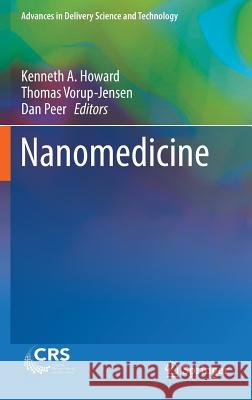Nanomedicine » książka
topmenu



Nanomedicine
ISBN-13: 9781493936328 / Angielski / Twarda / 2016 / 378 str.
Nanomedicine
ISBN-13: 9781493936328 / Angielski / Twarda / 2016 / 378 str.
cena 603,81
(netto: 575,06 VAT: 5%)
Najniższa cena z 30 dni: 578,30
(netto: 575,06 VAT: 5%)
Najniższa cena z 30 dni: 578,30
Termin realizacji zamówienia:
ok. 16-18 dni roboczych.
ok. 16-18 dni roboczych.
Darmowa dostawa!
Kategorie:
Kategorie BISAC:
Wydawca:
Springer
Seria wydawnicza:
Język:
Angielski
ISBN-13:
9781493936328
Rok wydania:
2016
Wydanie:
2016
Numer serii:
000420922
Ilość stron:
378
Waga:
7.16 kg
Wymiary:
23.5 x 15.5
Oprawa:
Twarda
Wolumenów:
01
Dodatkowe informacje:
Bibliografia
Wydanie ilustrowane
Wydanie ilustrowane
"This engrossing book is devoted to nanomedicine, one of the fastest-growing and revolutionary branches of healthcare. ... The book Nanomedicine provides a well-done and up-to-date review of hot topics in the field of nanomedicine and gives insight to this exciting interdisciplinary subject." (Alena Gabelova, Neoplasma, Vol. 64 (2), 2017)
1 Nanomedicine: working towards defining the field.- 2 Complement regulators and inhibitors in health and disease: A structural perspective.- 3 The art of complement: complement sensing of nanoparticles and consequences.- 4 The nanoscience of polyvalent binding by proteins in the immune response .- 5 Microfluidics-based Single Cell Analytical Platforms for Characterization of Cancer.- 6 Nanotheranostics and in-vivo imaging.- 7 Targeting cancer using nanocarriers.- 8 The importance of particle geometry in design of therapeutic and imaging nanovectors.- 9 Delivery of peptides and proteins to the brain using nano-drug delivery systems and other formulations.- 10 Polymer-based DNA delivery systems for cancer immunotherapy.- 11 The use of silk in nanomedicine applications.- 12 Nanotoxicology and regulatory affairs.- 13 The application of nanotechnology for implant drug release.- 14 Guided cellular responses by surface cues for nanomedicine applications
Kenneth Alan Howard is an Associate Professor and Group Leader at the Department of Molecular Biology at the Interdisciplinary Nanoscience Center (iNANO), Aarhus University, Denmark. His research and teaching activities are focused on delivery science, nanomedicine and RNA interference. Kenneth Alan Howard received a PhD in Pharmaceutical Science from the University of Nottingham, UK, and has held postdoctoral positions at the CRC Institute for Cancer Studies, University of Birmingham, UK and the School of Pharmacy, University of London. Dr Howard is an active member of the Controlled Release Society serving on the Board of Scientific Advisors (chair), Nominations Committee and organizer of a CRS Educational workshops “RNA Interference Biology and Therapeutics” and “Albumin: the next generation therapeutic.
Dan Peer is a translational scientist and Professor that leads an NIH-funded lab in the Faculty of Life Science and the Faculty of Engineering at Tel Aviv University (TAU). He is also the Director of the Focal Technology Area (FTA) on Nanomedicines for Personalized Theranostics, a National Nanotechnology Initiative and the Director of the Leona M. and Harry B. Helmsley Nanotechnology Research Fund. Prof. Peer’s work was among the first to demonstrate systemic delivery of RNAi molecules using targeted nanocarriers to the immune system and he pioneered the use of RNA interference (RNAi) for in vivo validation of new drug targets within the immune system. He is an editor of several books in the field of nanomedicine, Editor of Molecular and Cellular Therapies (Springer); Editor of Biology and Medicine in Nanotechnology (IOP), an Associate Editor of the Journal of Controlled Release (Elsevier); Journal of Biomedical Nanotechnology, and of Biochemistry, and on the Editorial Boards of the Biomedical Microdevices (Springer), Cancer Letters (Elsevier), Nanomedicine: Nanotechnology, Biology and Medicine (Elsevier) and Bioconjugate Chemistry (ACS). Prof. Peer is currently the President of the Israeli Chapter of the Controlled Release Society, and a Member of the Israel Young Academy of Sciences and Humanities.
Thomas Vorup-Jensen is head of the Biophysical Immunology Laboratory in Department of Biomedicine and a member of the iNANO at Aarhus University. He received a PhD in medicine from Aarhus University on topics involving the discovery, characterization and recombinant manufacture of molecules of the complement system. More recently, he was awarded from the same institution the Doctor of Medical Science degree following a dissertation on polyvalent interactions between molecules of the immune system and their targets, which includes certain nanomedicines. Following his work as Research Fellow in Pathology with Harvard Medical School and later employment with Aarhus University, his research has focused on understanding the nanoscience of protein ligand recognition. In addition to his academic efforts, Prof. Vorup-Jensen and his laboratory actively collaborate with industry partners to translate scientific findings into new treatments of clinical unmet needs, in particular focusing on autoimmune and infectious diseases. Prof. Vorup-Jensen is on the editorial boards of Frontiers in Pharmacology, Frontiers in Immunology, and Molecular and Cellular Therapies. Prof. Vorup-Jensen was recently elected member of The Danish Academy of Natural Sciences.
This book is set to meet medical challenges such as early and effective diagnosis, high throughput drug discovery and targeted delivery, as well as modalities for organ and tissue replacement to better enable personalized medicines. This unique title aims to capture the broad nature of the field whilst maintaining focus on the key elements that establishes it as a bona fide field, making it highly attractive to both researchers and students by providing an excellent guide and learning tool for those requiring an introduction to the subject. Contributions from prominent scientists in the field of immunology, molecular biology, and delivery and material science provide “snapshots” of this interdisciplinary field assembled in a single volume. Nanomedicine is a valuable text for those working or wanting an education into this high-impact field.
1997-2026 DolnySlask.com Agencja Internetowa
Zobacz: Księgarnia Czeska | Wydawnictwo Książkowe Klimaty | Mapa strony | Lista autorów
KrainaKsiazek.PL - Księgarnia Internetowa
KrainaKsiazek.PL - Księgarnia Internetowa









